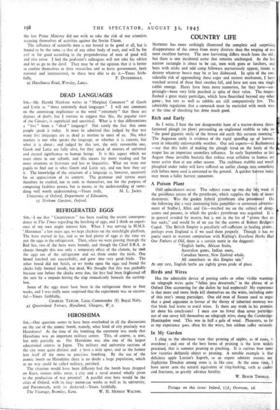DEAD LANGUAGES SIR, —Mr. Harold Nicolson writes in " Marginal Comment
" of Greek and Latin as " those extremely dead languages." I will not comment on the interesting implication in the word " extremely " that there are degrees of death, but I venture to suggest that this, the popular view of the Classics, is superficial and uncritical. What is it that differentiates a " live " from a " dead " language? Not surely the fact that some people speak it today. It must be admitted that judged by that test many live languages are as dead as mutton to most of us. No, what matters is not who speaks the language, or whether it is current, but 'what it is about.; and judged by this test, the only reasonable one, Greek and Latin are fully alive, for they speak of matters of universal and eternal significance to human beings It is this aspect which we must stress in our schools, and this means far more reading and far more attention to literature and less to linguistics. What we want our pupils to find out is what Greek and Latin say, and not how they say it. The knowledge of the structure of a language is, however, .necessary for an appreciation of its content. The grammar and syntax must therefore be studied, not as ends in themselves, nor, for the purpose, of composing faultless proses, but as means to the understanding of some- thing well worth understanding.—Yours truly, - M. L. JACKS.
University of Oxford, Department of Education, Norhant Gardens, Oxford.


























 Previous page
Previous page